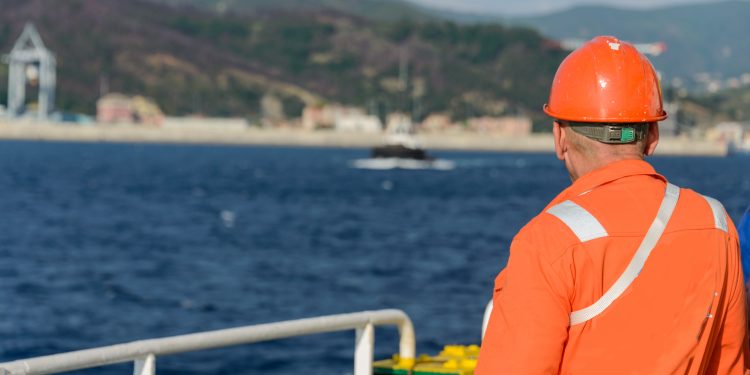American Club released the “Addressing and Managing Seafarer Mental Health Challenges” document in cooperation with the Seamen’s Church Institute (SCI), to provide guidance and assist help seafarers and ship operators better understand the factors that contribute to mental health challenges for seafarers and what can be done to prevent and mitigate such effects on crews.
According to the document, seafaring can provide skilled and responsible individuals with excellent career prospects, good wages, long holidays, responsibility, travel opportunities, and job satisfaction. Conversely, there are certain aspects unique to the lives of mariners that can contribute to stress, causing reactions that can affect physical health, mental wellbeing, and workplace morale. Such stresses apply to mariners regardless of whether they are on long sea voyages, on coastal trading, or working aboard vessels on inland waterways.
In particular, extreme stresses can negatively impact mental wellbeing. Research has shown that seafarers suffer higher rates of mental health-related problems than do the general population and other working occupations. Furthermore, mental health conditions have a cost in productivity: for example, in 2022 the United States Department of Labor reported $193.2 billion in lost earnings per year in the United States alone due to mental health related issues.
Social stressors
- long periods of time spent away from family, friends, cultural norms, and professional resources such as therapists or psychologists;
- cross-cultural social and language barriers amongst crews that might create stress or increase isolation;
- the advantages and disadvantages of telecommunications and social media that may make seafarers aware of problems at home they cannot do anything about, possibly increasing a sense of helplessness. These communications can also exacerbate feelings of missing out on quality time with family and friends at home, making seafarers feel yet more isolated;
- a personality or culture of self-sufficiency or fear that may impact willingness to admit suffering or a need for help; and/or
- long working hours in a communal setting, in an environment where one can either feel stigma about saying one is struggling or feel it is more socially acceptable to push through and not ask for help.
When the need for professional mental health is indicated, it is a good practice for the ship owners and ship operators to assist the seafarer in obtaining such treatment. It is believed that seafarers who are able to safely disclose mental health struggles with the cooperation and assistance of the ship owner or ship operator and receive treatment become safer employees than those who suppress concerns for fear of lost income. With competent care and treatment,
seafarers can return to work and be ready for productive employment while reducing the risk of future medical deviation and repatriation. Professional mental health care can be provided by qualified:
- Port chaplains, who are available in many ports to provide counseling and referrals to mental health care professionals
- Psychological care in port, which can be arranged in advance of a port call by ship’s operators and agents
- Telemedicine services while at sea, which are equipped to provide professional mental health care to seafarers
Preventative measures and support resources
As explained, according to a recent study, the positive correlations for depression, anxiety, and suicidal ideation in seafarers include: lack of adequate training on how to respond to a mental health crisis aboard; an unaware or uncaring work environment; exposure to violence or threats of violence; co-existing medical conditions; low job satisfaction; ill health. Shipowners, ship operators and ships’ Masters can maximize a crew’s resilience and wellbeing by taking preventative measures and accessing support resources. For example:
- Ship owners and ship operators should establish a defined policy and relevant training for Masters, as well as the company’s crewing and human resources departments ashore to consider how to promote mental wellness for their shipboard crew members. This should include preventative measures (e.g., anti-bullying and anti-harassment training) identifying those who may be at risk, and coordinating between the Master and the company’s crewing and resource departments to properly manage any persons found to be at-risk on-board ship. Challenges for Masters to support their crew should also be identified and training provided that takes into consideration their own mental health issues, or cultural barriers and beliefs.
- Good internet access allows seafarers not only to communicate with their support network of friends and family at home, but could also enable communications with mental health resources and professionals. This could be kept confidential, giving crew members the access and opportunity they need to get help. Companies, labor unions, or other health care providers should be encouraged to consider providing a telemedicine mental health
consult option to seafarers as part of their normal medical benefits if they are not normally provided by a socialized medical option from where the seafarers reside. - Adding support structures amongst the crew, such as a buddy system or mentorship program whereby crew members are encouraged to actively support and check in with each other. This is particularly important to support those with limited sea experience and cadets. It is most likely that seafarers will turn to a fellow trusted crew member before approaching senior officers, so this could be an effective preventative strategy. Another avenue would be to ensure that crew members identify a designated person at home whom they would contact or who could be contacted if the need arose.
- Port chaplains visit many ships every day and quickly sense the individual and crew morale aboard ship. Even on the ships with the best morale, an individual seafarer can be preoccupied by a personal or back-home distraction and find it helpful to talk it through with a neutral third-party.
- Quality of food, opportunities for rest, hygiene, regular exercise, and positive team spirit strengthen the overall ship morale.
- Shore leave allows respite from the worksite, personal errands, and opportunity to “see the world.” Often, it can be difficult to take advantage of this due to short turnaround times in port or maritime security-related restrictions. The shore leave restrictions put in place because of the COVID-19 pandemic had a significant effect on seafarer wellbeing. Shore leave should be prioritized where possible, to allow seafarers to relax and decompress after time at sea.
- Drills and skills—from fire drills to anti-piracy and harassment prevention training— equip crew and empower them to respond to acute stressors. Policies and training to reduce bullying and harassment reduce behaviors that demean others and threaten their wellbeing. A well-trained seafarer becomes more confident and less stressed.
- Recognition and appreciation from shipowners and ship operators of the work their ship Masters and seafarers are doing. Recognition for service well done could be considered to boost morale.
Helpful ways for seafarers to foster good mental health on an individual level include:
- normalizing mental wellness as a natural extension of overall health and safety;
- maintaining a consistent schedule of rest and exercise, as well as having a healthy diet;
- communicating and spending time with other people for support;
- engaging in positive activities (e.g. sports, hobbies, listening to music, reading, regularlyscheduled religious services as may be applicable); and
- seeking confidential professional help or counseling where and when possible


































































